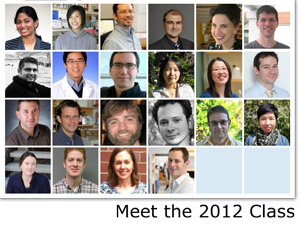22 of America's Most Promising Scientists Selected as Pew Biomedical Scholars
 Philadelphia —Twenty-two of the nation's most innovative young researchers were named Pew Scholars in the Biomedical Sciences by The Pew Charitable Trusts today. The Scholars join a prestigious community that includes Nobel Prize winners, MacArthur Fellows, and recipients of the Albert Lasker Medical Research Award.
Philadelphia —Twenty-two of the nation's most innovative young researchers were named Pew Scholars in the Biomedical Sciences by The Pew Charitable Trusts today. The Scholars join a prestigious community that includes Nobel Prize winners, MacArthur Fellows, and recipients of the Albert Lasker Medical Research Award.
“During these challenging budgetary times when traditional sources of funding are becoming even harder for scientists to obtain, we are proud to back our country's most promising scientists,” said Rebecca W. Rimel, president and CEO of The Pew Charitable Trusts. “This funding comes at points in the Scholars' professional lives when they often are the most innovative. While this program is a bold investment for us, it has paid incalculable dividends due to our Scholars' record of producing groundbreaking research.”
The new class of scholars is exploring a range of human health issues from antibiotic-resistant infections to liver disease and cancer.
Launched in 1985, the Pew Scholars Program in the Biomedical Sciences identifies and invests in talented researchers in medicine or biomedical sciences. In that time, over 500 Pew Scholars have received more than $130 million in funding. By backing them early in their careers, this program enables our most promising scientists to take calculated risks and follow unanticipated leads to advance human health.
“Giving young scientists the means and the confidence to pursue outside-the-box research is vital to the advancement of biomedical science,” said Craig C. Mello, Ph.D., a 1995 Pew Scholar and a 2006 Nobel Laureate in Physiology or Medicine. “The Pew Scholars Program in the Biomedical Sciences was a critical step in my career, and as Chair of the national advisory committee, I am honored to welcome the 2012 awardees into a family of scientists eager to share ideas and to collaborate for years to come.”
The program is rigorously competitive, and recipients receive $240,000 over four years to pursue their research without restriction. To be considered, applicants from all areas of physical and life sciences related to biomedical study must be nominated by an invited institution and demonstrate both excellence and innovation in their research. This year, 179 institutions were requested to nominate a candidate, and 134 eligible nominations were received.
The initiative is run by The Pew Charitable Trusts, which also directs the Pew Latin American Fellows in the Biomedical Sciences, a program that for 21 years has provided support for young scientists from Latin America to receive postdoctoral training in the United States.
The new 2012 Pew Scholars are:
Dinu Florin Albeanu, Ph.D.
Cold Spring Harbor Laboratory
Neuroscience
Peter V. Cornish, Ph.D.
University of Missouri
Biochemistry and Biophysics
Maximiliano A. D'Angelo, Ph.D.
University of California, San Francisco
Cell Biology
D. Allan Drummond, Ph.D.
University of Chicago
Biochemistry and Molecular Biology
Nels C. Elde, Ph.D.
University of Utah
Evolutionary Genetics, Cell Biology
Donald Fox, Ph.D.
Duke University Medical Center
Tissue Repair and Genome Stability
Robert C. Froemke, Ph.D.
Skirball Institute, New York University
School of Medicine
Neuroscience
Wolfram Goessling, M.D., Ph.D.
Dana-Farber Cancer Institute
Developmental and Regenerative Biology
Xue Han, Ph.D.
Boston University
Neuroscience
Ivaylo I. Ivanov, Ph.D.
Columbia University Medical Center
Immunology
Salil A. Lachke, Ph.D.
University of Delaware
Developmental Genetics
Saskia B. Neher, Ph.D.
University of North Carolina, Chapel Hill
Protein Biochemistry
Lorin E. Olson, Ph.D.
Oklahoma Medical Research Foundation
Developmental and Regenerative Biology
Kevin K. Park, Ph.D.
University of Miami Miller School of Medicine
Neuroscience
Sohini Ramachandran, Ph.D.
Brown University
Human Genomics and Evolution
Vanessa Ruta, Ph.D.
The Rockefeller University
Neuroscience
Aimee Shen, Ph.D.
University of Vermont
Microbiology
Alexander Sher, Ph.D.
University of California, Santa Cruz
Neuroscience
Alexander V. Statsuk, Ph.D.
Northwestern University
Chemical Biology
Kathryn E. Wellen, Ph.D.
University of Pennsylvania
Cancer Metabolism and Epigenetics
Mee-Ngan F. Yap, Ph.D.
Saint Louis University
Molecular Microbiology
Wenjun Zhang, Ph.D.
University of California, Berkeley
Chemical and Synthetic Biology
For full biographies and information regarding the Scholars' research, please visit http://directory.pewscholars.org/.











